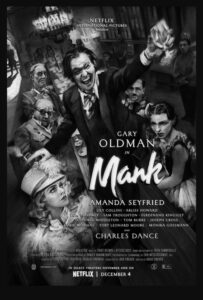Film Review: Controlled to a Fault, “Mank” Offers Mostly Engaging Tribute to the Author of “Kane”
Written by: Christopher Llewellyn Reed | December 3rd, 2020

Mank (David Fincher, 2020) 3 out of 4 stars.
At the tender age of 24, Orson Welles, the incredibly precocious star of stage and radio, fresh off the notoriety that his 1938 broadcast of The War of the Worlds granted him, signed a contract with RKO, then one of Hollywood’s big movie studios. Searching for a subject that would launch his film career, he floundered around for a bit before landing on the idea that would both place him in the cinematic firmament for all time and sow the seeds of his undoing. That would be Citizen Kane, a loose dramatization, of sorts, of the life of newspaper tycoon William Randolph Hearst. The film is much more than mere biography, however, but a reimagining of the art of the motion picture. Critically successful, it failed at the box office, thanks in no small part to the power of the Hearst media empire, though it has since gone on to be consistently hailed as the greatest, or one of the greatest, movies ever made. Enough about Welles, however. Let’s talk about the screenwriter, Herman J. Mankiewicz.
For he is the central protagonist of David Fincher’s latest work, Mank (so called because of Mankiewicz’s nickname). The older brother of Joseph L. Mankiewicz, who himself would go on to become one of Hollywood’s great writer-directors (and who features in this movie, as well), Mank was already down on his luck by the time he connected with young Welles. A brilliant writer, he was also very much an alcoholic, burning bridges throughout the 1930s until there were very few left. Fortunately for posterity, he still had enough talent left within by 1940 to deliver one hell of a screenplay for the rising diva. Originally entitled “American,” the script provided its director with a formally innovative blueprint to tackle themes of ambition, hubris, overreach and comeuppance (among others), all of which would end up playing roles in Welles’ own trajectory, as if Mankiewicz could look into the future and see how much life would imitate art. First, however, art would imitate life.

Gary Oldman (Darkest Hour) plays Mankiewicz, bringing all his considerable craft to the role of a broken man who refuses to accept the break. Convalescing in bed after a car accident, though installed in an isolated villa Welles sets up for him, his Mank is an intellectual dynamo, despite constant cravings for a drink. Assisted by his secretary-for-the-occasion, Rita Alexander (Lily Collins, Netflix’s Emily in Paris series), Mank writes round the clock, barely sleeping until he figures out how to open the liquor cabinet for a nightcap. Since watching someone, even if interesting, dictate words to an assistant hardly makes for a gripping tale, Fincher (Gone Girl) – working off a screenplay by his own late father, Jack Fincher – takes us through flashback after flashback to show us how Mank got here, and how that journey informed what would become his masterpiece.
Shot digitally (which is how Fincher has rolled since the 2007 Zodiac), Mank nevertheless has been designed to look and sound like a classic studio production, with rich black-and-white tones, dialogue occasionally recorded or mixed to sound like ADR (automated dialogue replacement) – along with an overall mono sound mix – and more tricks from that era. It’s as much homage as biopic, steeping us in the period and offering historical and gossipy tidbits galore. It is, above all else, a cinephile’s fever dream.

Fincher is always good with actors, both through casting and direction. His Mank ensemble is stellar, from Oldman to Collins and beyond. Perhaps the most delightful player is Amanda Seyfried (First Reformed), as Marion Davies, Hearst’s mistress and, according to this movie, a close confidante of Mank for a while. Thanks to Citizen Kane, which cast Dorothy Comingore as a dissipated, talentless singer propped up by Kane until she can’t take it anymore, Davies has often been unfairly thought of in the same light, but she had a real career of her own (though one promoted by Hearst, for sure). In Mank, thanks to Seyfried, she comes across as a clever, vivacious sort (if certainly a drinker), sparkling lightly next to the heavy-handed Hearst (Charles Dance, Euphoria). Every scene she is in ends up memorable.
Unfortunately, despite its strengths, Mank is also sometimes dull, and unlikely to appeal to those not so interested in movie lore. Its meticulously constructed parts do not always add up to the most engaging whole, though those individual sections offer many a fascinating anecdote. Perhaps the way the screenplay forces all the past debacles of Mank’s life, including his ruined relationship with Hearst, into the shape of the inevitable Citizen Kane feels overly determined. Then again, that fits into how that movie, itself, was written, with A leading to B leading to C (though not in that order), so there is more than a little method to Fincher’s opposite-of-madness (some lunacy might have helped, in fact). But no matter how one feels about such tightly controlled drama, there is far more that engages here than doesn’t. It may not be Kane, but it is a worthy-enough tribute.


